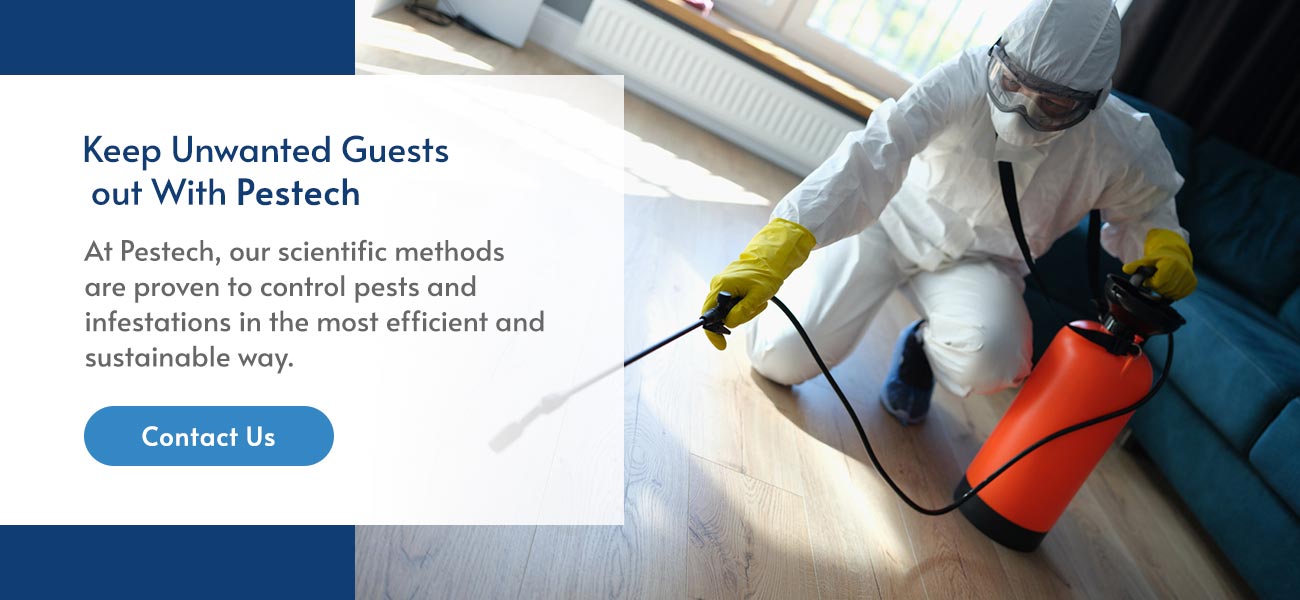7 Most Common Bugs in Hotels
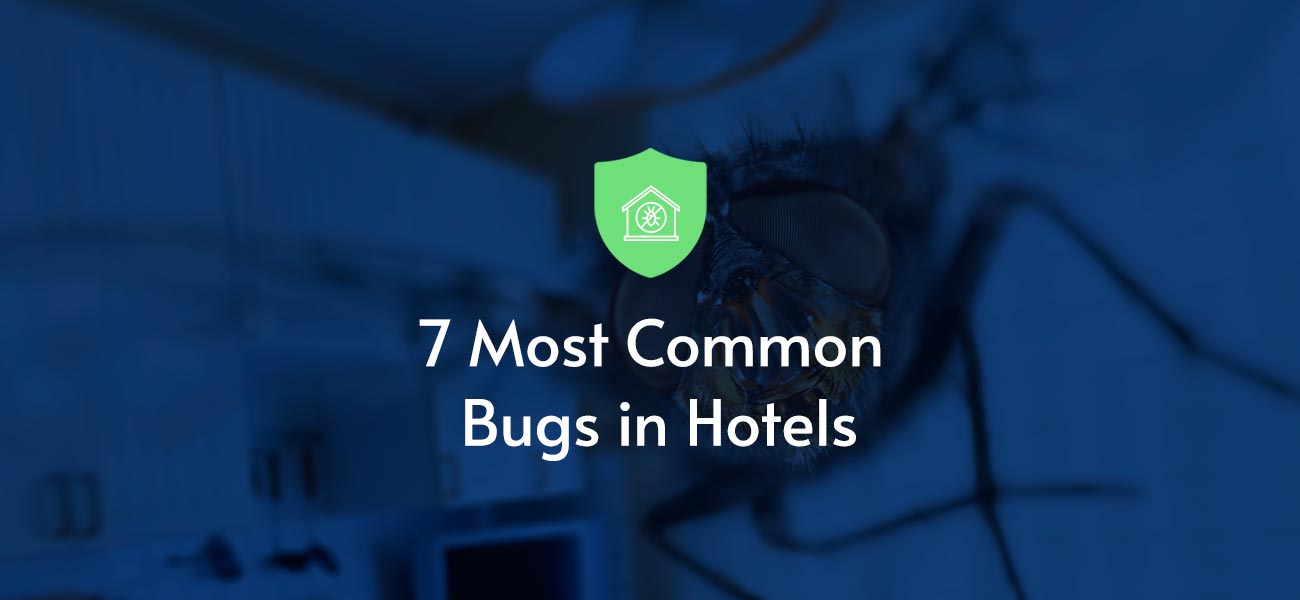
Running a business in the hospitality industry can be a challenging task, and when pests are added to the equation, it can become even more difficult. With the average hotel facing up to seven infestations every five years, it’s easy to see how pests can be quite costly for businesses.
Beyond monetary costs, hotels risk their reputation if word gets out about infestations. Luckily, you can take a few steps to prevent these tiny pests from becoming a big problem. Below are the most common bugs found in hotels and tips for protecting your building, guests and reputation.
1. Bed Bugs
Bed bugs are some of the most common hotel bugs. They can be brought into hotels by guests, employees and even laundry carts, though they’re often difficult to see due to their small size. While guest rooms are the most common areas for bed bugs to gather, dining areas, bars and lounges can also become infested, creating health implications for your staff and guests.
Bed bugs can infest spaces in or around:
- Mattresses
- Bedding
- Carpeting
- Cracks in furniture
- Behind the headboard
- Wallpaper
- Clutter beside a bed
- Box springs and dust ruffles
While the most common bugs found in hotels, bed bugs can also be the trickiest to spot. You can check for bed bugs in your hotel and quickly detect them by following these steps:
- Pull back bed sheets and blankets. Check the mattress and box spring seams for bed bugs, especially near the head of the bed.
- Keep your eyes open for dark, rust-colored spots.
- Check upholstered furniture.
- Inspect luggage racks or valet for cracks and crevices.
- Check along the edging, seams and other small areas of the mattress and box spring.
- Use a flashlight to look at the space between the wall and the headboard.
- Search furniture around the bed and pictures hanging on the wall.
- Inspect the cracks and crevices of the nightstand, including joints, drawers and screw holes.
These tiny pests aren’t a reflection of your hotel’s cleanliness. They can be found anywhere, often spreading from person to person as a result of travel. Bed bugs don’t spread disease, nor are they seen as dangerous, but allergic reactions could require a doctor’s visit. Their bites look like flea or mosquito bites, creating a swollen red spot that might hurt or itch.
Proper management of these insects is crucial to your hotel’s reputation. Training staff to recognize and adequately respond to bed bug sightings can prevent infestations and protect your reputation. Professional pest control services can help you develop an integrative pest management plan that works for your business.
2. Cockroaches
Cockroaches are common bugs found in hotels, often congregating near areas with a lot of moisture and heat, such as pool rooms and kitchens. They can also be found in employee personnel belongings, break rooms and locker rooms. Cockroaches come out at night to find scraps of food and are drawn to decaying matter. During the day, you can find these pests hidden in cracks, crevices and underneath furniture.
These pests enter hotels through luggage or small cracks and openings in your building. They can promptly multiply over a short period, so one cockroach is all it takes for a pest infestation that causes health issues. Cockroaches carry viruses and microorganisms that can cause serious diseases. They’re also known to carry bacteria like E. coli, salmonella and listeria.
It’s crucial to appropriately train employees to learn how to spot signs of cockroach infestations. The key to detecting cockroaches is to pay special attention to dark and damp areas in hotel kitchens and bathrooms, such as beneath sinks and fridges. Droppings that resemble coffee grounds are signs of these pests.
To prevent cockroaches in your hotel, you can:
- Do a quick inspection of incoming shipments, including food and linens.
- Remove the cardboard from shipments to prevent them from harboring pests.
- Repair leaks immediately to reduce moisture in your hotel.
Pest control services can help properly detect and control these insects to protect your employees and guests.
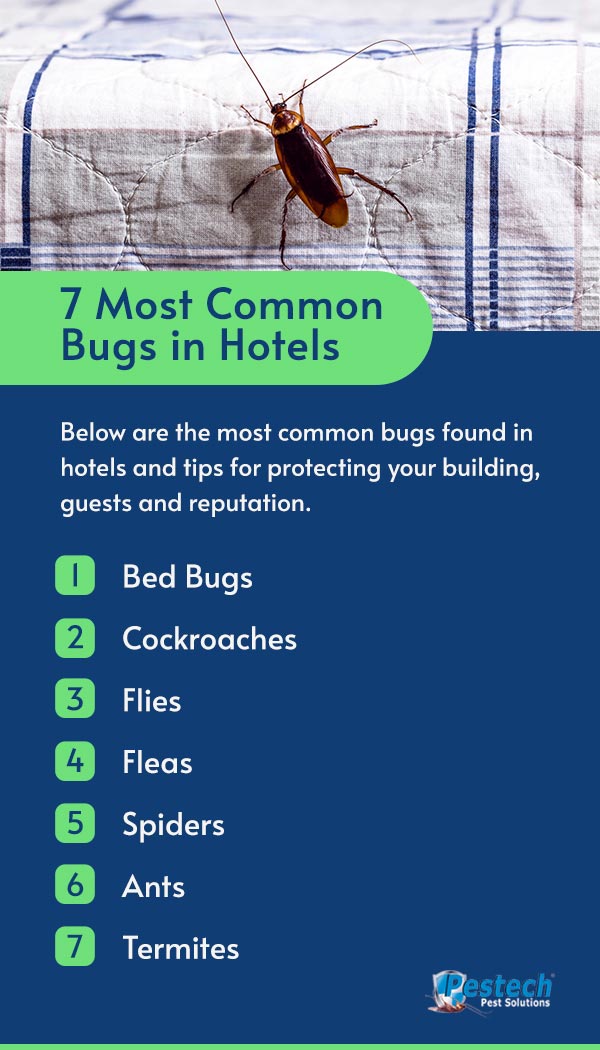
3. Flies
Flies are common hotel bugs that are easy to detect. Just the sight of a single fly in a dining area or hotel room can affect a guest’s impression of a business. Flies can be found wherever there’s wet organic material, such as areas with poor sanitation, drains, grease traps, garbage disposal units or beverage serving areas.
Flies are attracted to food odors and can quickly get into hotels through small cracks and openings. They’ll often gather near food and garbage in the kitchen and dining areas. You can prevent flies in your hotel by:
- Removing organic debris.
- Using fans to help dry floors in kitchens and food serving areas.
- Cleaning beverage dispenser trays and drain lines regularly, including beer tap trays in hotel bars and lounges.
- Keeping doors closed when not in use.
- Keeping dumpsters and dumpster pads clean.
- Making sure doors are properly sealed.
- Fitting any open doors with screens.
Like other pests, flies can rapidly multiply. They also carry diseases that can impact people’s health. Take control of the situation quickly to maintain a pleasant environment and keep your hotel employees and guests safe.
4. Fleas
Fleas are bothersome for hotel guests because of their irritating bites. These pests tend to feed and breed on animal hosts, though several types can bite humans, including cat, dog, bird and rat fleas. Hotel guests and their pets can be a source of fleas. Wildlife pests like birds and rats can also bring fleas into hotels by resting on or in your building.
Fleas lay their eggs on an animal’s fur or feathers, a person’s clothing or the sleeping areas of the host. The larvae feed on organic matter before developing into pupae. Fleas can survive over winter in the larva or pupa stage or several months in the cocoon. While it can be difficult to prevent fleas from entering hotels, professionals can control them by:
- Identifying the pest.
- Determining the source of the infection.
- Carefully controlling the problem.
- Treating the infested areas.
These pests also bring the potential risk of diseases from bacteria, viruses and parasites. Flea control is best left to professionals, who can ensure they don’t spread throughout your hotel by providing routine inspections and pest management.
5. Spiders
You can often spot spiders in dark, cluttered and undisturbed areas of guest rooms, basements or crawl spaces. You might notice their webs near windows, doors, light fixtures or corners. While spiders are mostly harmless and contribute positively to the surrounding ecosystem, you’ll want to do what you can to keep them in nature and out of your hotel.
To prevent spiders in your hotel, implement a few daily tasks, such as:
- Keeping areas clear of spider webs by vacuuming.
- Getting rid of a standing water supply.
- Affixing windows and screens.
- Removing signs of webbing.
The most effective way to eliminate spiders is by calling upon professional pest control services. This way, you can let experts remove them effectively to improve the comfort of your guests and ensure the spiders remain outdoors where they belong.
6. Ants
Ants can invade hotels no matter the season, quickly eating away at food and infrastructure. The United States is home to over 700 species of ants, making them some of the most common hotel bugs in the nation. Destructive species like carpenter or fire ants can cause costly property damage in just a short amount of time and can be challenging to get rid of as they nest quickly.
Ants are active at all times of the day and will often enter businesses when temperatures are too hot or cold. Signs of an ant infestation include:
- Food crumbs or debris, usually in a line.
- Wood shavings.
- Small piles of dirt or sand around your property.
- Damp or rotting wood where pests can live and hide.
- Soft rustling coming from the inside of your walls.
Though ants don’t pose a health risk, they can contaminate food and affect your company’s reputation, so you’ll want to keep them out. You can manage ants most effectively by calling for professional help.
7. Termites
Among the most common bugs found in hotels, termites are often the most overlooked. However, the property damage they cause is unmissable, and they often pose health and safety risks by compromising your building’s structural integrity.
You can prevent termites by:
- Fixing leaks around your hotel.
- Removing wood that’s touching the ground as it provides a pathway for termites to enter your property.
- Inspecting your hotel regularly for signs of termites.
A few familiar places to look out for termites include the basement, roof, hotel doors, wooden furniture, walls and cornices. Try to take note of the state of your doors, walls and cornices to eliminate problems and prevent damage. Wood with termite infestations is usually thin and papery. You might notice sawdust or wood chips on the floor near a wooden surface that could indicate a termite problem.
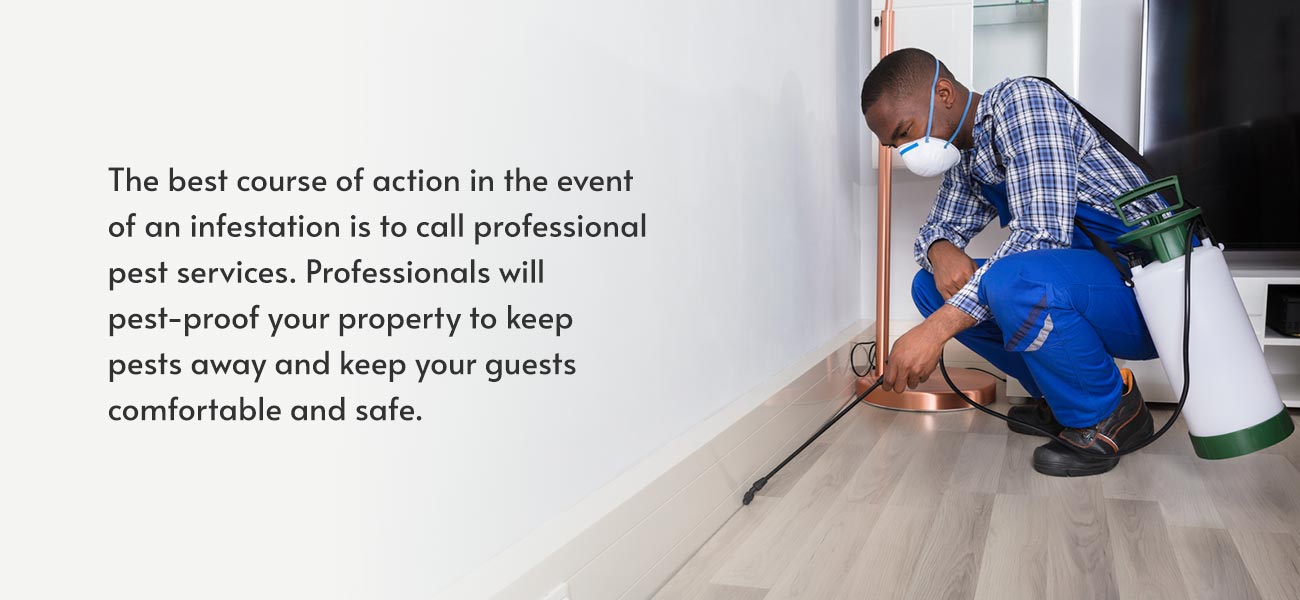
What to Do if You Have an Infestation
The best course of action in the event of an infestation is to call professional pest services. Professionals will pest-proof your property to keep pests away and keep your guests comfortable and safe.
The experts at Pestech are licensed and highly trained in pest management. We perform safe and effective fumigation services to eliminate problems and protect your business. Our methods are eco-friendly and can achieve total pest control of populations in 72 hours.
With our 100% satisfaction guarantee, you can appreciate quick and effective solutions for even the most challenging, extensive pest issues. Under our guarantee, if initial treatments are unsuccessful, we’ll provide pest control services at no additional charge until the problem is resolved.
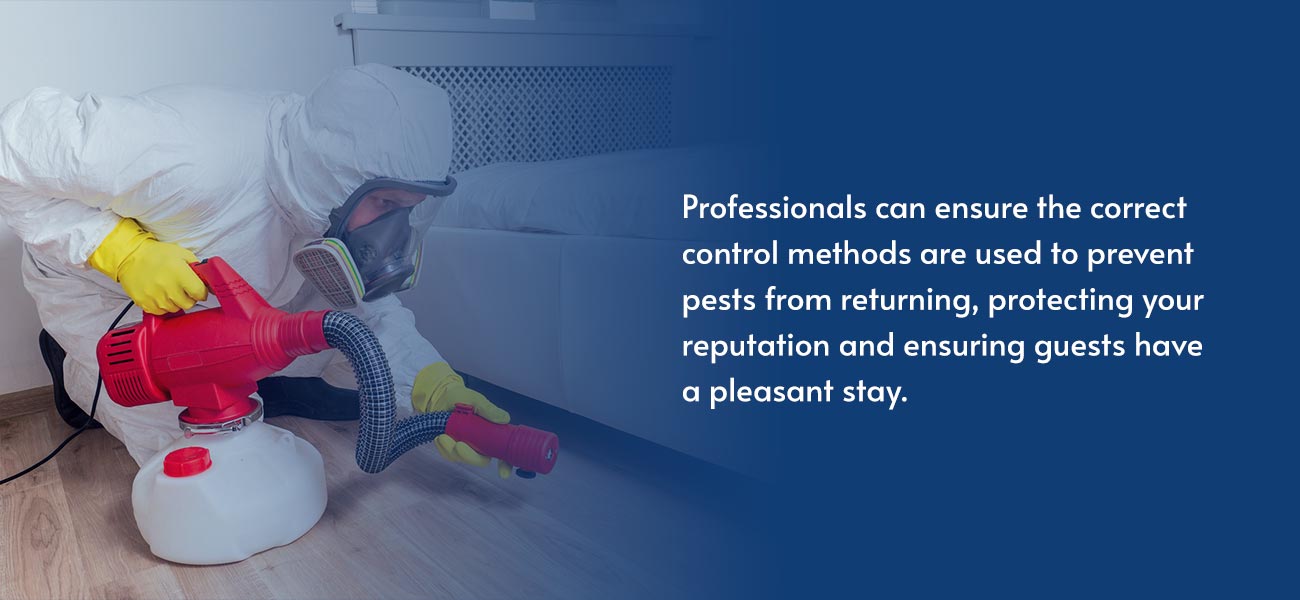
How to Protect Your Hotel From Pests
When you partner with a professional pest control company, they’ll help you develop a policy to keep pests out. Integrated pest management involves inspection, identification, monitoring, evaluating and appropriately controlling pests.
Professionals can ensure the correct control methods are used to prevent pests from returning, protecting your reputation and ensuring guests have a pleasant stay. Steps for pest control in your hotel include:
- Inspection: Professionals at Pestech will inspect and correctly identify the pest your hotel is having issues with. This way, we can design and employ the most effective control methods to help. Experts will examine vulnerable areas like entry points and estimate population levels to manage pests.
- Prevention: We’ll pest-proof your hotel and make appropriate habitat adjustments to prevent infestations. This might include sealing entry points to reduce the pest’s prevalence in your hotel.
- Control: Pestech will exclude, repair and sanitize your property to control pests and keep them from returning. Our methods are scientifically designed and proven to work. We even provide eco-friendly pest control solutions with our innovative GreenPro program.
Aside from the above, hotel owners and managers can prevent pests by monitoring for signs of them, cleaning rooms regularly, storing food appropriately, sealing off entry points and following up on customer complaints. Customer experience and business reputation are essential in the hospitality industry. You can make the customer experience positive by ensuring the proper measures are taken to resolve issues to the customer’s satisfaction.
Keep Unwanted Guests out With Pestech
Pest control in hotels is crucial to ensure the health and safety of your staff and guests and uphold your positive reputation. While there are several common hotel bugs that can interfere with business operations, professionals can help eliminate problems before they get out of hand.
At Pestech, our scientific methods are proven to control pests and infestations in the most efficient and sustainable way. We’ll customize an effective program for your hotel to ensure the services and attention you deserve. Appreciate regular inspections and monitoring to catch pest problems before they become serious. In the event of an infestation, we can safely eliminate the problem to help your hotel flourish.
For expert pest control services, contact us today.

